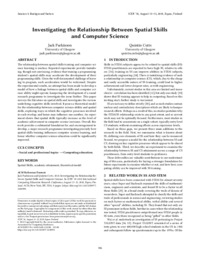Investigating the Relationship Between Spatial Skills and Computer ScienceJack Parkinson, Quintin I. Cutts
Publikationsdatum:
Zu finden in: ICER 2018 (Seite 106 bis 114), 2018
|
 |
 Diese Seite wurde seit 2 Jahren inhaltlich nicht mehr aktualisiert.
Unter Umständen ist sie nicht mehr aktuell.
Diese Seite wurde seit 2 Jahren inhaltlich nicht mehr aktualisiert.
Unter Umständen ist sie nicht mehr aktuell.
 Zusammenfassungen
Zusammenfassungen
The relationship between spatial skills training and computer science learning is unclear. Reported experiments provide tantalising, though not convincing, evidence that training a programming student's spatial skills may accelerate the development of their programming skills. Given the well-documented challenge of learning to program, such acceleration would be welcomed. Despite the experimental results, no attempt has been made to develop a model of how a linkage between spatial skills and computer science ability might operate, hampering the development of a sound research programme to investigate the issue further. This paper surveys the literature on spatial skills and investigates the various underlying cognitive skills involved. It poses a theoretical model for the relationship between computer science ability and spatial skills, exploring ways in which the cognitive processes involved in each overlap, and hence may influence one another. An experiment shows that spatial skills typically increase as the level of academic achievement in computer science increases. Overall, this work provides a substantial foundation for, and encouragement to develop, a major research programme investigating precisely how spatial skills training influences computer science learning, and hence whether computer science education could be significantly improved.
 Dieses Konferenz-Paper erwähnt ...
Dieses Konferenz-Paper erwähnt ...
 Personen KB IB clear | Stephen Cooper , Maya Israni , Anthony Robins , Janet Rountree , Nathan Rountree , Carsten Schulte , Sheryl Sorby , Karen Wang | ||||||||||||||||||||||||||||||||||||
 Aussagen KB IB clear | Programmieren ist schwierig | ||||||||||||||||||||||||||||||||||||
 Begriffe KB IB clear | Informatikcomputer science
, Informatik-Unterricht (Fachinformatik)Computer Science Education
,  MINT MINT science, technology, engineering, mathematics
, notional machine
, science, technology, engineering, mathematics
, notional machine
,  Programmieren Programmieren programming programming
| ||||||||||||||||||||||||||||||||||||
 Bücher |
| ||||||||||||||||||||||||||||||||||||
 Texte |
|
 Dieses Konferenz-Paper erwähnt vermutlich nicht ...
Dieses Konferenz-Paper erwähnt vermutlich nicht ... 
 Nicht erwähnte Begriffe | Informatik-Didaktik, Informatikunterricht in der Schule |
 Tagcloud
Tagcloud
 Zitationsgraph
Zitationsgraph
 Zitationsgraph (Beta-Test mit vis.js)
Zitationsgraph (Beta-Test mit vis.js)
 3 Erwähnungen
3 Erwähnungen 
- Proceedings of the 14th Workshop in Primary and Secondary Computing Education, WiPSCE 2019, Glasgow, Scotland, UK, October 23-25, 2019 (2019)
- Exploring Spatial Skills and Computing in Primary and Secondary Education (Jack Parkinson) (2019)


- Cognitive Correlates of Computational Thinking - Evaluation of a Blended Unplugged/Plugged-In Course (Katerina Tsarava, Luzia Leifheit, Manuel Ninaus, Marcos Román-González, Martin V. Butz, Jessika Golle, Ulrich Trautwein, Korbinian Moeller) (2019)


- Exploring Spatial Skills and Computing in Primary and Secondary Education (Jack Parkinson) (2019)
- WIPSCE '23 - The 18th WiPSCE Conference on Primary and Secondary Computing Education Research (Sue Sentance, Mareen Grillenberger) (2023)
- Improving Computational Thinking with Spatial Skills Development in Primary School (Jack Parkinson) (2023)


- Improving Computational Thinking with Spatial Skills Development in Primary School (Jack Parkinson) (2023)
 Anderswo finden
Anderswo finden
 Volltext dieses Dokuments
Volltext dieses Dokuments
 |  Investigating the Relationship Between Spatial Skills and Computer Science: Fulltext at the ACM Digital Library ( Investigating the Relationship Between Spatial Skills and Computer Science: Fulltext at the ACM Digital Library ( : :  , 1268 kByte; , 1268 kByte;  : :  2020-11-28) 2020-11-28) |
 Anderswo suchen
Anderswo suchen 
 Beat und dieses Konferenz-Paper
Beat und dieses Konferenz-Paper
Beat hat Dieses Konferenz-Paper während seiner Zeit am Institut für Medien und Schule (IMS) ins Biblionetz aufgenommen. Beat besitzt kein physisches, aber ein digitales Exemplar. Eine digitale Version ist auf dem Internet verfügbar (s.o.). Es gibt bisher nur wenige Objekte im Biblionetz, die dieses Werk zitieren.










 Biblionetz-History
Biblionetz-History